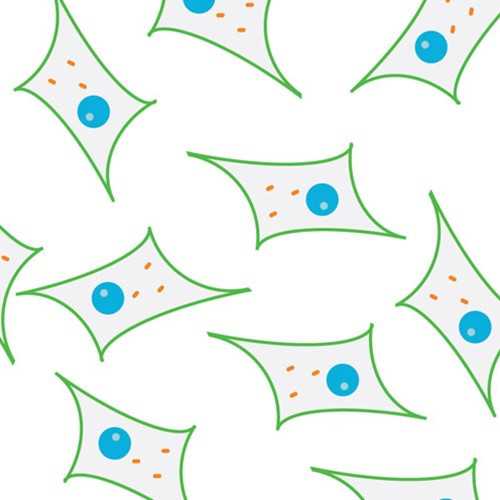DLD-1 Colorectal Adenocarcinoma SIRT1 Knock Out Cell Line (DLD-1 SIRT1 KO)
Human Dukes-type C colorectal adenocarcinoma cell line, DLD-1 with a complete deletion of the Sirtuin 1 (SIRT1) gene.
SIRT1 is the most conserved mammalian NAD+-dependent protein deacetylase and an important cellular metabolic and stress sensor. Through deacetylation of transcription factors and co-factors critically involved in metabolic homeostasis, inflammatory responses, and stress resistance, SIRT1 directly couples cellular metabolic status (via NAD+) to transcriptional reprogramming in response to environmental changes.
From the laboratory of Xiaoling Li, PhD, National Institute of Environmental Health Sciences/NIH.
Human Dukes-type C colorectal adenocarcinoma cell line, DLD-1 with a complete deletion of the Sirtuin 1 (SIRT1) gene.
SIRT1 is the most conserved mammalian NAD+-dependent protein deacetylase and an important cellular metabolic and stress sensor. Through deacetylation of transcription factors and co-factors critically involved in metabolic homeostasis, inflammatory responses, and stress resistance, SIRT1 directly couples cellular metabolic status (via NAD+) to transcriptional reprogramming in response to environmental changes.
From the laboratory of Xiaoling Li, PhD, National Institute of Environmental Health Sciences/NIH.
This product is for sale to Nonprofit customers only. For profit customers, please Contact Us for more information.
| Product Type: | Cell Line |
| Name: | DLD-1 SIRT1 KO |
| Cell Type: | Human colorectal adenocarcinoma cell |
| Accession ID: | Q96EB6 |
| Organism: | Homo sapiens, human |
| Source: | Colon |
| Morphology: | Epithelial |
| Biosafety Level: | BSL 1 |
| Subculturing: | Adherent, 1:3 to 1:10 dilution |
| Growth Conditions: | RPMI-1640 + 10% FBS |
| Cryopreservation: | Complete growth medium supplemented with 10% DMSO |
| Storage: | LN2 |
| Shipped: | Dry Ice |

- Ren NSX, Ji M, Tokar EJ, Busch EL, Xu X, Lewis D, Li X, Jin A, Zhang Y, Wu WKK, Huang W, Li L, Fargo DC, Keku TO, Sandler RS, Li X. Haploinsufficiency of SIRT1 Enhances Glutamine Metabolism and Promotes Cancer Development. Curr Biol. 2017 Feb 20;27(4):483-494.
- Chen TR, Hay RJ, Macy ML. Intercellular karyotypic similarity in near-diploid cell lines of human tumor origins. Cancer Genet Cytogenet. 1983 Dec;10(4):351-62. PubMed PMID: 6652615.
- Chen TR, Dorotinsky CS, McGuire LJ, Macy ML, Hay RJ. DLD-1 and HCT-15 cell lines derived separately from colorectal carcinomas have totally different chromosome changes but the same genetic origin. Cancer Genet Cytogenet. 1995 Jun;81(2):103-8. PubMed PMID: 7621404.
- Trainer DL, Kline T, McCabe FL, Faucette LF, Feild J, Chaikin M, Anzano M, Rieman D, Hoffstein S, Li DJ, et al. Biological characterization and oncogene expression in human colorectal carcinoma cell lines. Int J Cancer. 1988 Feb 15;41(2):287-96. PubMed PMID: 3338874.
- Dexter DL, Barbosa JA, Calabresi P. N,N-dimethylformamide-induced alteration of cell culture characteristics and loss of tumorigenicity in cultured human colon carcinoma cells. Cancer Res. 1979 Mar;39(3):1020-5. PubMed PMID: 427742.
- Rodrigues NR, Rowan A, Smith ME, Kerr IB, Bodmer WF, Gannon JV, Lane DP. p53 mutations in colorectal cancer. Proc Natl Acad Sci U S A. 1990 Oct;87(19):7555-9. PubMed PMID: 1699228; PubMed Central PMCID: PMC54786.
- Keesee SK, Meneghini MD, Szaro RP, Wu YJ. Nuclear matrix proteins in human colon cancer. Proc Natl Acad Sci U S A. 1994 Mar 1;91(5):1913-6. PubMed PMID: 8127905; PubMed Central PMCID: PMC43274.
- Vermeulen SJ, Chen TR, Speleman F, Nollet F, Van Roy FM, Mareel MM. Did the four human cancer cell lines DLD-1, HCT-15, HCT-8, and HRT-18 originate from one and the same patient? Cancer Genet Cytogenet. 1998 Nov;107(1):76-9. PubMed PMID: 9809040.
- Kutchera W, et al. Protaglandin H synthase 2 is expressed abnormally in human colon cancer: evidence for a transcriptional effect. Proc. Natl. Acad. Sci. USA 93: 4816-4820, 1996. PubMed: 8643486
If you publish research with this product, please let us know so we can cite your paper.


